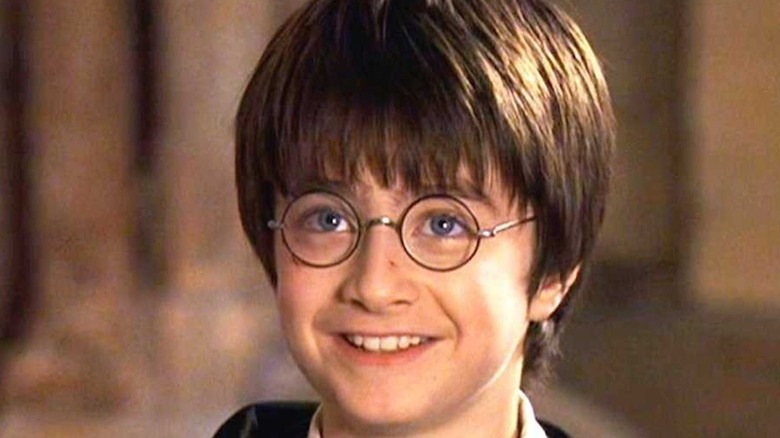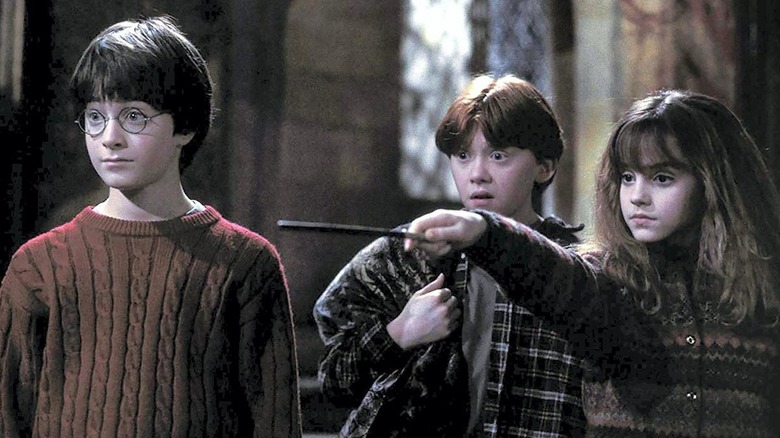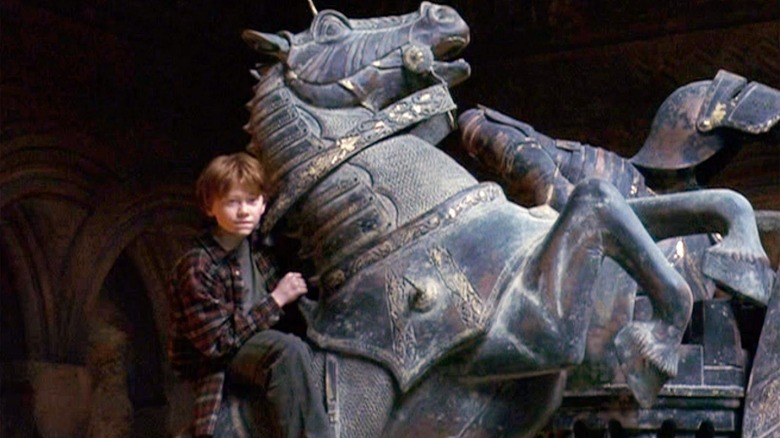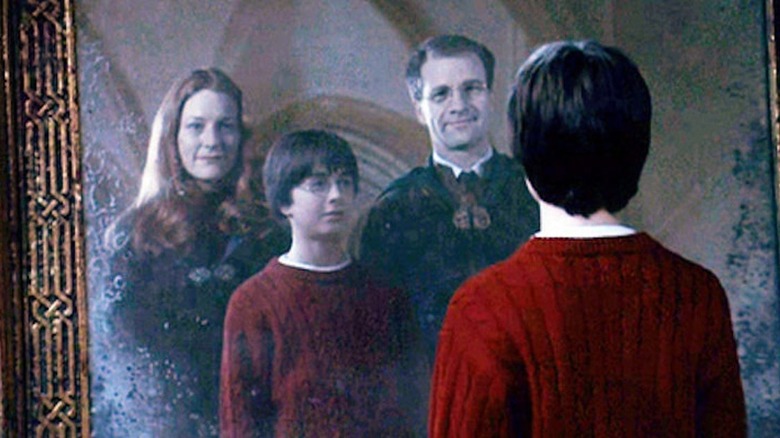The Ending Of Harry Potter And The Sorcerer's Stone Explained
As the first entry in the "Harry Potter" film series, "Harry Potter and the Sorcerer's Stone," stands as a piece of film history. What "Star Wars" had done for fantasy in a science-fiction setting, "Harry Potter" achieved for fantasy in a distinctly English setting. It felt bright and new, and captured the inner child of many readers and moviegoers worldwide thanks to the faithfulness of its adaptation, the strength of its core cast, and the quality of its effects. Popular film critic Roger Ebert even hailed it as "a classic" right off of the bat.
There were good reasons for this kind of reception as well. "The Sorcerer's Stone" serves as a fantastic beginning to what would become an eight movie series full of epic moments of humor, loss, victory, and amazement. It is distinctly a child's story, allowing the film's tone to grow with its core characters, who are only 11 at the series' beginning. However, it hints at the more adult trials that await its principal characters while also establishing the core characteristics that make them worthy heroes even as they mature.
Harry's bravery foreshadows his epic future
Taking "Harry Potter and the Sorcerer's Stone" at face value, the film's first two acts are more about discovery and childlike wonder. The once-abused Harry is swept from his life of neglect and mistreatment at the hands of his aunt and uncle, to one where the impossible is possible. In the magical world, Harry is a wealthy celebrity, a talented athlete, and a gifted wizard with a bright future. Up until the film's climax, where Harry confronts Voldemort, Harry is living out every child's fantasy.
What makes Harry a hero, however, isn't any of his talents. He may seem especially gifted by fate, but that doesn't mean much when your life's on the line. Instead, Harry's heroism (Harry-ism, perhaps?) derives from his bravery, the defining feature of Gryffindor house. He proves this bravery after he is tempted by Voldemort and still chooses to oppose him, refusing to hand over the Sorcerer's Stone and even miraculously fighting off Voldemort;s host, Professor Quirrell.
Though Harry has been bold from the movie's beginning, standing up to Draco and sneaking around the school at night, his choice to investigate the Sorcerer's Stone and oppose Voldemort firmly cements this characterization. This stays consistent for the rest of the series, as Harry continually takes initiative in the fight against Dark Magic even when he doesn't need to. Unlike other heroes, Harry isn't necessarily forced into conflicts (at least until he gets older) — he runs headlong into them, proving his mettle long after the events of "Sorcerer's Stone."
The story isn't just about Harry
Despite what the series' name might suggest, however, Harry Potter isn't the only important person in this story. Though he proves himself a hero all by his lonesome, Harry would never reach Voldemort — or bypass the challenges which preceded the Dark Wizard — if it wasn't for his friends Hermione and Ron. Of course, as the two other main characters of the "Harry Potter" series, the two stalwart allies put on their own displays of heroism in the film's final hours.
Of the trio, Hermione is the first to receive an opportunity to be a hero. After the two sneak into the series of chambers meant to guard the Sorcerer's Stone, they encounter a new kind of trap. The floor of one chamber is no floor at all, but rather a deadly plant known as Devil's Snare, which strangles struggling victims. Ever the book-worm, however, Hermione is the only one with the knowledge and courage to relax herself. She and Harry (who follows her lead) pass through unharmed. Unfortunately, Ron is not so composed, and Hermione has to show her strengths again by recalling a light spell capable of repelling Devil's Snare.
Meanwhile, Ron receives his own heroic moment during the last challenge, a life-sized version of Wizard's Chess. Ron proves himself both a seasoned strategist and a courageous leader when he sacrifices himself on the board to allow Harry the chance to check-mate the opposing pieces. Ron and Hermione are pretty heroic in "Sorcerer's Stone," and they remain heroes for the rest of the series, staying by Harry's side no matter what.
Human connection is Harry's greatest ally
One important conclusion to be gathered from each of these characters' heroic moments is that success is only achieved through human connection. Harry would never have bypassed the many chambers guarding the Sorcerer's Stone if his most trusted friends weren't right there with him willing to put their own lives on the line to reach the same goal. They share a bond and a level of trust that makes them more than the sum of their parts. After all, these challenges were put in place by Hogwarts teachers, some of Britain's greatest wizards — yet three 11-year-olds manage to surpass them all.
The idea that human connection is Harry's greatest weapon is revealed by Dumbledore in the film's final moments, when he reveals that Harry was only able to defeat Quirrell and Voldemort because of the enduring love-magic his mother cast to protect him on the night Voldemort murdered her. Harry did not know it, but the love of his friends and family had always been there to prop him up when his courage and skills alone weren't enough to do the job. Ultimately, in the franchise's final installments, Harry learns just how important his mother's sacrifice was in his battle against Voldemort... and "Sorcerer's Stone" gives audiences a taste of what's to come.



